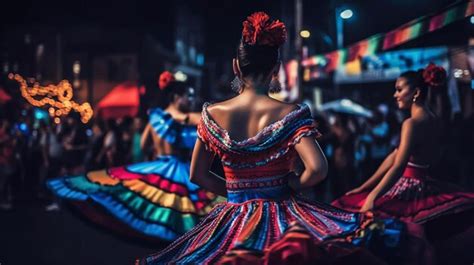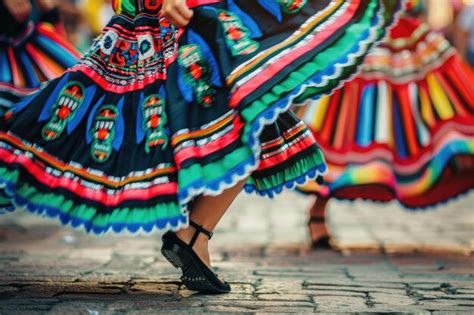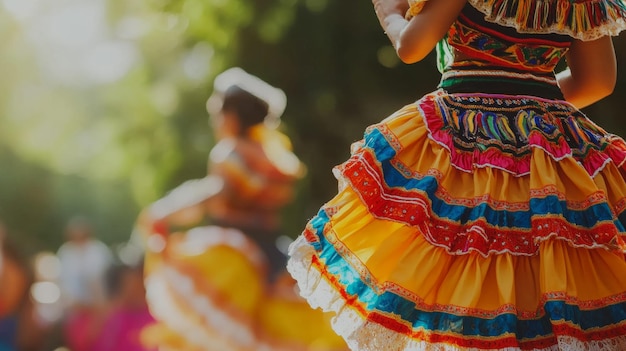Mexican Heritage Month is a time to celebrate the rich cultural history and vibrant traditions of Mexico and its people. Held annually from September 15 to October 15, this month-long celebration highlights the profound impact of Mexican culture on the world, particularly in the United States. From the arts to culinary delights, and historical contributions to modern innovations, Mexican Heritage Month honors the diverse and meaningful ways Mexican heritage has shaped society. This vibrant fiesta of culture not only offers a glimpse into Mexico’s past but also serves as a reflection on the future, fostering a deeper appreciation for the traditions and values that continue to inspire generations.
Join ritarblog.com for a detailed examination of this topic.
1. Historical Significance
Mexican Heritage Month has its roots in the early 1960s, initially conceived as a celebration honoring the independence of various Latin American nations, including Mexico. Mexico’s struggle for independence commenced on September 16, 1810, with the iconic “Grito de Dolores” led by Miguel Hidalgo, signaling the start of the Mexican War of Independence against Spanish dominion. This date carries profound cultural and historical significance, embodying the Mexican people’s unwavering resilience and determination in their pursuit of liberty.
Mexican Heritage Month transcends the commemoration of independence, serving as a time to recognize and celebrate the impactful contributions Mexican Americans have made to society. From building strong communities to influencing political and social progress, their legacy is undeniable. This month-long celebration offers a platform to illuminate the struggles, triumphs, and lasting impact of Mexican history, fostering deeper understanding and respect for the shared heritage between Mexico and other nations. By reflecting on this history, we not only honor past achievements but also emphasize the ongoing importance of safeguarding and celebrating Mexican cultural identity in the present.

2. Cultural Traditions
Mexican Heritage Month is a vibrant celebration of Mexico’s rich cultural traditions, stemming from centuries of history and diverse influences. This month-long event brings traditional Mexican customs to life with colorful parades, folk music, and elaborate dance performances. One of the highlights is the iconic Ballet Folklórico, which showcases the distinct regional cultures of Mexico. The intricate artistry of traditional clothing, including brightly colored embroidered garments and sombreros, contributes to the festive atmosphere.
Music and dance take center stage, featuring vibrant mariachi bands and dancers who express Mexican rhythms with grace and passion. Traditions like colorful papel picado banners and Día de los Muertos altars serve as powerful reminders of Mexico’s artistic and spiritual heritage.
Mexican culture thrives on the strength of family and community gatherings, where celebrations revolve around the shared joys of food, music, and storytelling. Mexican Heritage Month, a time for honoring both ancient indigenous customs and the enduring Spanish influences on modern Mexican traditions, offers Mexican Americans a space to reconnect with their heritage. It also invites everyone, regardless of background, to participate in the appreciation and celebration of Mexico’s rich cultural tapestry.

3. Community Celebrations
Mexican Heritage Month is a time for vibrant celebrations that showcase unity, pride, and cultural expression. Throughout cities in both the United States and Mexico, events are organized to honor Mexican heritage. These gatherings often bring large crowds together for festivities, filling the streets with parades, festivals, and public performances. Traditional music, dance, and art are showcased, allowing participants to actively engage with the rich cultural legacy of Mexico.
These celebrations often extend beyond festivities to incorporate educational events, such as historical reenactments and exhibits. These events provide a deeper understanding of Mexico’s past and present. Local schools, cultural centers, and civic organizations often host workshops, lectures, and cultural fairs that highlight the achievements and contributions of Mexican Americans.
Food fairs are an essential part of these gatherings, showcasing authentic Mexican cuisine, from tacos to tamales, that bring families and neighbors together. These community celebrations create an inclusive environment, welcoming everyone to experience the joy and pride of Mexican culture, fostering a deeper appreciation for its enduring influence and traditions.

4. Notable Contributions
Mexican Americans have made countless contributions across diverse fields, profoundly shaping the cultural, social, and political fabric of the United States. From renowned artists like Diego Rivera and Frida Kahlo, whose works have left an indelible mark on global art movements, to writers like Octavio Paz and Sandra Cisneros, who have enriched literature with their distinctive voices, Mexican culture continues to be a wellspring of inspiration.
Science and technology have benefited from the groundbreaking contributions of individuals like Ellen Ochoa, the first Hispanic woman in space, and Dr. Mario Molina, a Nobel Prize-winning chemist. Mexican Americans have also been instrumental in advancing civil rights, with leaders such as César Chávez advocating for the rights of farmworkers and Dolores Huerta championing labor equality.
Mexican Heritage Month honors the significant contributions of Mexican Americans, showcasing their profound impact on education, the arts, public service, and various other fields. Their accomplishments embody the resilience, innovation, and leadership that have consistently shaped both Mexican and American cultures.
5. Educational Initiatives
Mexican Heritage Month provides a valuable opportunity to foster awareness and understanding of Mexican culture and history. Schools and community organizations utilize this time to implement educational initiatives that engage individuals of all ages. Through interactive workshops, guest lectures, and informative exhibits, these programs delve into the multifaceted aspects of Mexican heritage, spanning its historical origins and showcasing its ongoing contributions to society.
Through projects centered on traditional Mexican crafts, history, and literature, students can develop a greater understanding and appreciation for cultural traditions. Educational institutions frequently include lessons on prominent figures, pivotal events, and the contributions of Mexican Americans to society, enabling students to connect with their heritage or explore it anew.
Libraries and cultural centers can offer enriching experiences that showcase Mexican traditions and contemporary issues. Through readings, film screenings, and performances, they provide a platform for dialogue and learning. These events foster cultural competency and promote inclusivity, enriching the community with a deeper understanding and appreciation of Mexican culture.
Through its integrated educational initiatives, Mexican Heritage Month serves to safeguard and celebrate Mexican culture. By doing so, it ensures that its contributions are acknowledged and comprehended by generations to come, fostering a sense of pride and belonging within the community.
6. Culinary Delights
Mexican Heritage Month is a celebration of the country’s vibrant culinary scene. It’s a time to embark on a delicious journey through Mexico’s rich gastronomic traditions, savoring authentic dishes that showcase the diverse flavors and influences of its various regions. From beloved street food to elaborate feasts, Mexican cuisine offers a mouthwatering exploration of the country’s culinary heritage.
Mexico’s culinary landscape is rich with tradition, showcasing a vibrant array of dishes. From the familiar flavors of tacos, enchiladas, tamales, and mole, each with its unique blend of spices, ingredients, and preparation techniques, to regional specialties like Oaxaca’s tlayudas, Yucatán’s cochinita pibil, and Jalisco’s birria, Mexican cuisine boasts an impressive diversity. These dishes often feature staples like corn, beans, chiles, and fresh herbs, a testament to the long-standing farming practices and culinary artistry that define Mexican food.
Mexican Heritage Month presents a chance to indulge in festive treats like pan de muerto, a sweet bread traditionally savored during Día de los Muertos. The month also features a vibrant array of salsas, ranging from fiery green to smoky red. Celebrations often include cooking demonstrations, food festivals, and tastings, where attendees can experience and learn about the rich history and cultural significance behind these beloved dishes.
Through the enjoyment of these culinary delights, participants develop a deeper understanding of the flavors and traditions that characterize Mexican cuisine. This celebration highlights the artistry and heritage of Mexico through its lively food culture.
7. Reflections and Future
As Mexican Heritage Month draws to a close, it provides an opportunity to contemplate the deep influence of Mexican culture and the continuous pursuit of cultural celebration and preservation. This month not only showcases the vibrant traditions and contributions of the Mexican community but also fosters a wider appreciation for the shared cultural legacy that enhances societies worldwide.
The future of Mexican Heritage Month holds the promise of greater visibility and appreciation for the rich tapestry of Mexican American culture. By expanding its reach and strengthening its impact, we aim to ensure that the stories, traditions, and contributions of Mexican Americans are recognized and valued. This includes deepening understanding through enhanced educational initiatives about Mexican history and culture, and fostering a more inclusive and dialogue-driven environment within diverse communities.
Mexican Heritage Month, now in full swing, seeks to inspire future generations to cherish and protect their cultural identity, fostering mutual respect and cultural exchange. By honoring both historical triumphs and current achievements, the month champions a future where cultural diversity is recognized as a source of strength. The vibrant heritage of Mexican culture continues to inspire and unite individuals worldwide.
Mexican Heritage Month is a vibrant celebration of Mexican culture, history, and contributions. Through exploring historical significance, cultural traditions, community celebrations, and notable achievements, this month offers a rich tapestry of Mexican heritage. Educational initiatives and culinary delights further enhance the appreciation of this diverse culture. As we reflect on the impact and look towards the future, Mexican Heritage Month not only honors past and present contributions but also inspires ongoing celebration and understanding. Embracing these traditions fosters a deeper connection to the cultural richness that continues to influence and inspire communities worldwide.
ritarblog.com

